北师大版高中英语模块一终结评价试题[上学期]
文档属性
| 名称 | 北师大版高中英语模块一终结评价试题[上学期] | 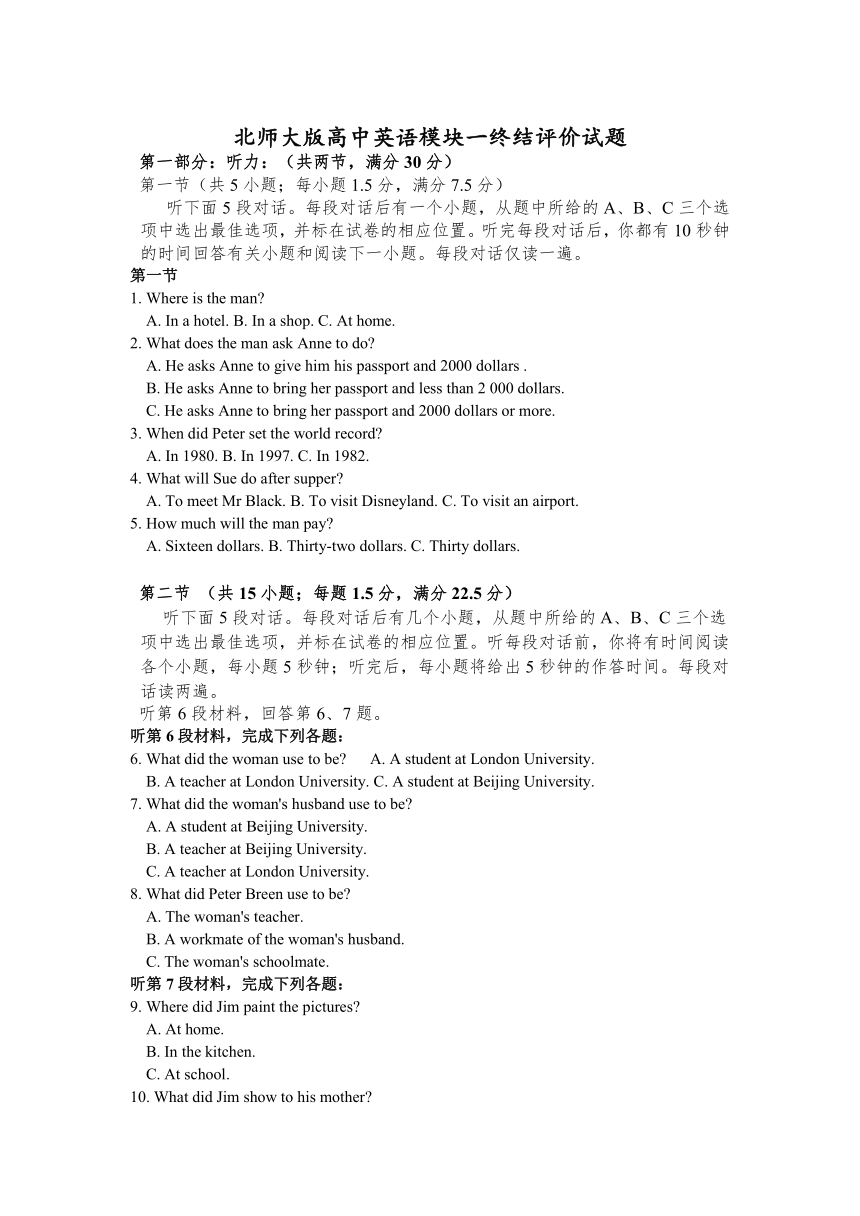 | |
| 格式 | rar | ||
| 文件大小 | 26.0KB | ||
| 资源类型 | 教案 | ||
| 版本资源 | 北师大版 | ||
| 科目 | 英语 | ||
| 更新时间 | 2007-11-23 13:53:00 | ||
图片预览

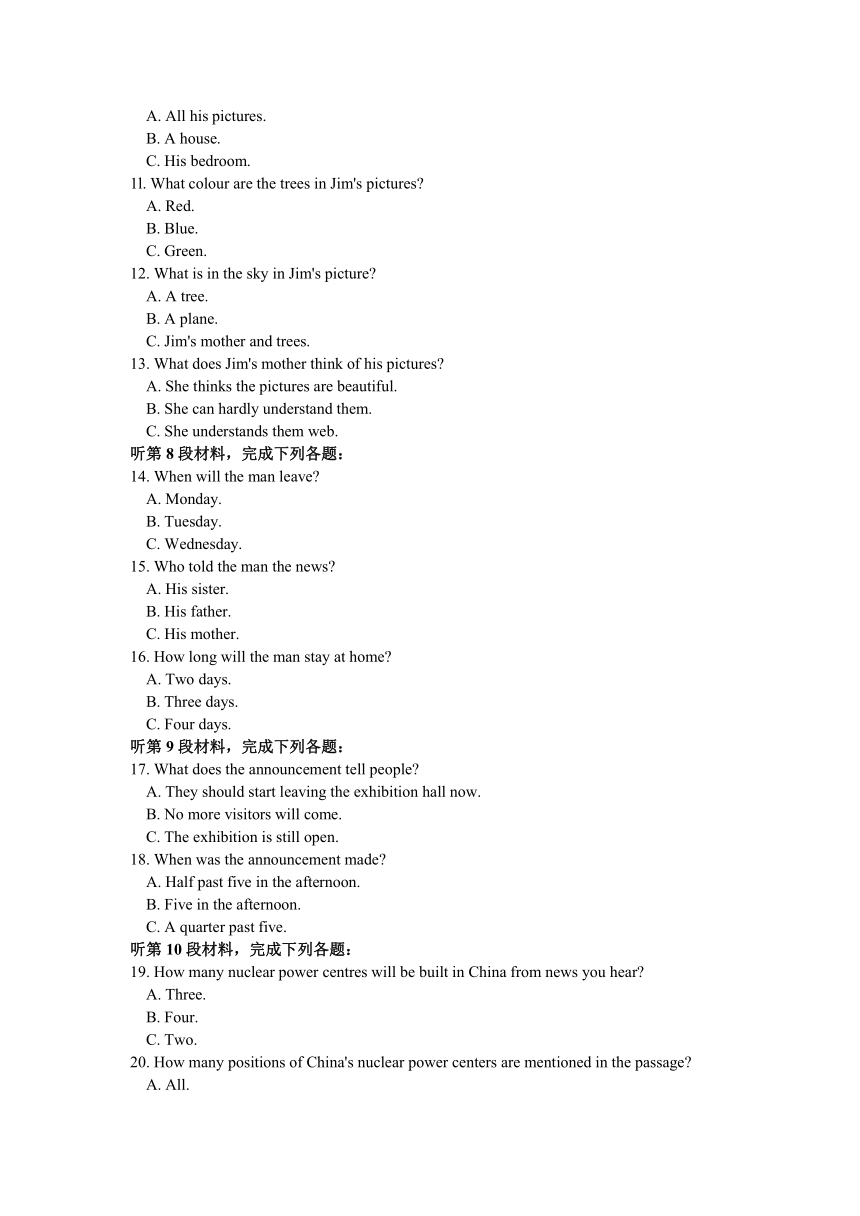
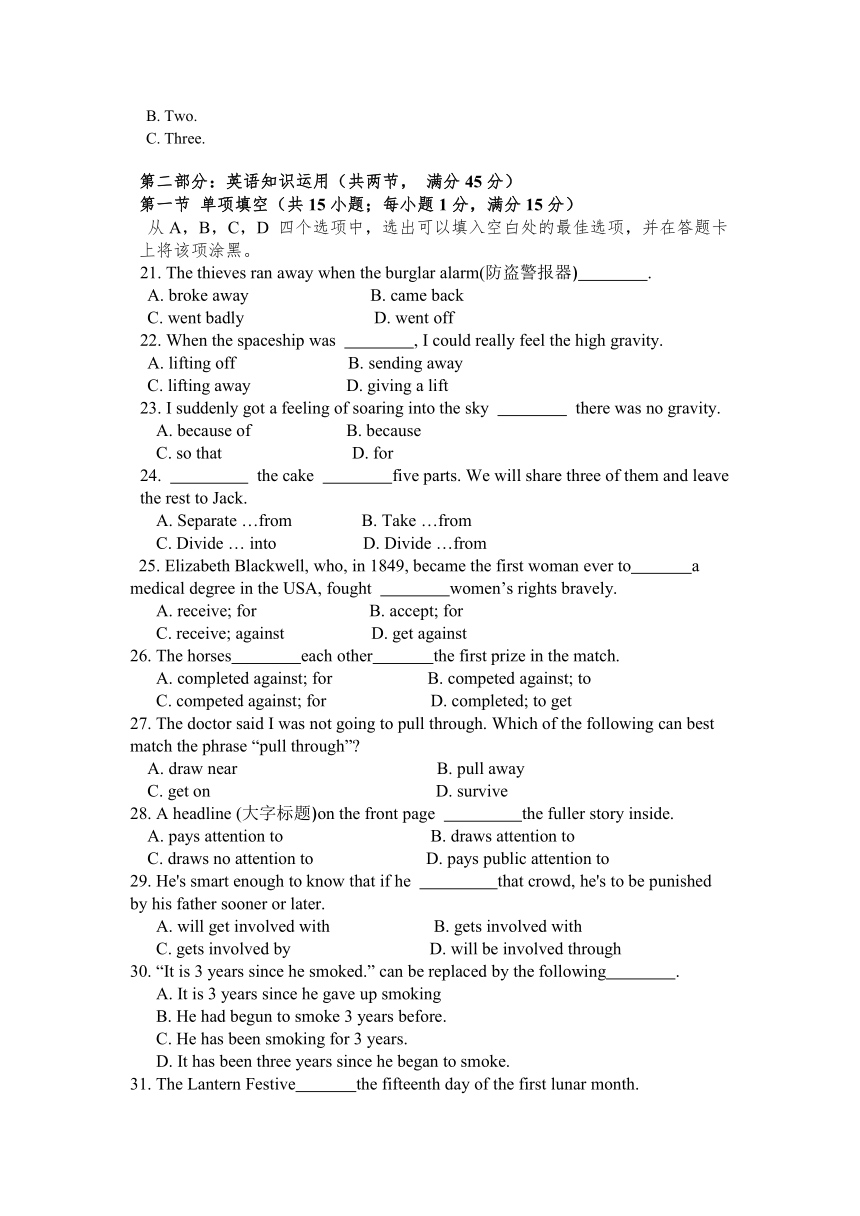
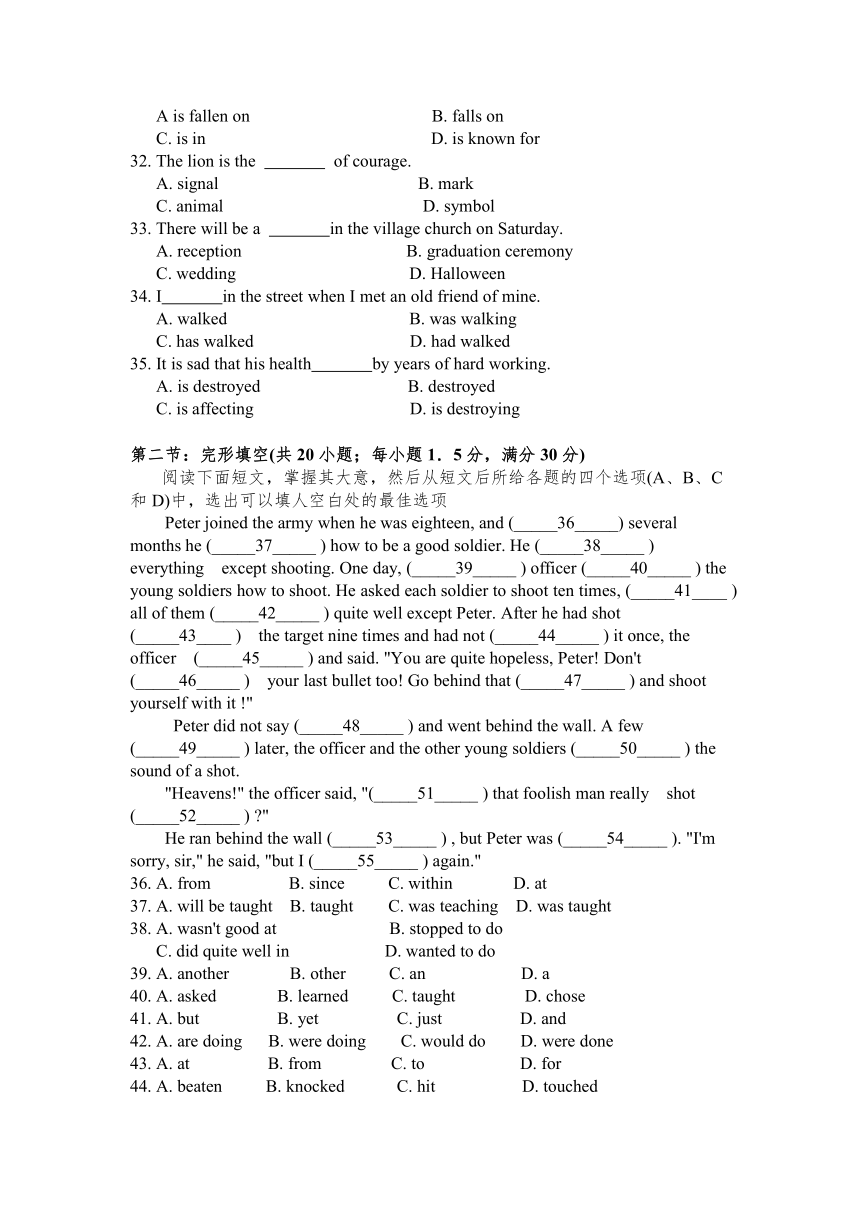
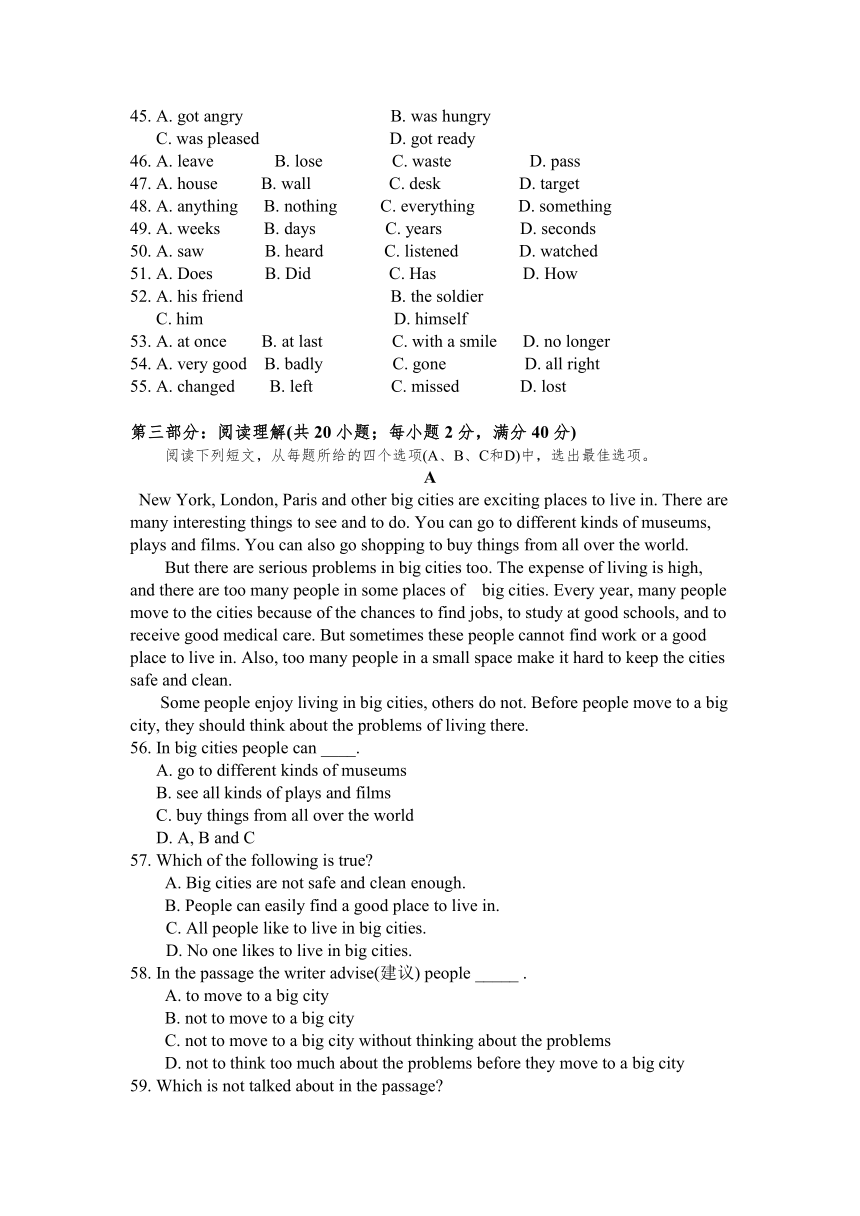
文档简介
北师大版高中英语模块一终结评价试题
第一部分:听力:(共两节,满分30分)
第一节(共5小题;每小题1.5分,满分7.5分)
听下面5段对话。每段对话后有一个小题,从题中所给的A、B、C三个选项中选出最佳选项,并标在试卷的相应位置。听完每段对话后,你都有10秒钟的时间回答有关小题和阅读下一小题。每段对话仅读一遍。
第一节
1. Where is the man?
A. In a hotel. B. In a shop. C. At home.
2. What does the man ask Anne to do?
A. He asks Anne to give him his passport and 2000 dollars .
B. He asks Anne to bring her passport and less than 2 000 dollars.
C. He asks Anne to bring her passport and 2000 dollars or more.
3. When did Peter set the world record?
A. In 1980. B. In 1997. C. In 1982.
4. What will Sue do after supper?
A. To meet Mr Black. B. To visit Disneyland. C. To visit an airport.
5. How much will the man pay?
A. Sixteen dollars. B. Thirty-two dollars. C. Thirty dollars.
第二节 (共15小题;每题1.5分,满分22.5分)
听下面5段对话。每段对话后有几个小题,从题中所给的A、B、C三个选项中选出最佳选项,并标在试卷的相应位置。听每段对话前,你将有时间阅读各个小题,每小题5秒钟;听完后,每小题将给出5秒钟的作答时间。每段对话读两遍。
听第6段材料,回答第6、7题。
听第6段材料,完成下列各题:
6. What did the woman use to be? A. A student at London University.
B. A teacher at London University. C. A student at Beijing University.
7. What did the woman's husband use to be?
A. A student at Beijing University.
B. A teacher at Beijing University.
C. A teacher at London University.
8. What did Peter Breen use to be?
A. The woman's teacher.
B. A workmate of the woman's husband.
C. The woman's schoolmate.
听第7段材料,完成下列各题:
9. Where did Jim paint the pictures?
A. At home.
B. In the kitchen.
C. At school.
10. What did Jim show to his mother?
A. All his pictures.
B. A house.
C. His bedroom.
1l. What colour are the trees in Jim's pictures?
A. Red.
B. Blue.
C. Green.
12. What is in the sky in Jim's picture?
A. A tree.
B. A plane.
C. Jim's mother and trees.
13. What does Jim's mother think of his pictures?
A. She thinks the pictures are beautiful.
B. She can hardly understand them.
C. She understands them web.
听第8段材料,完成下列各题:
14. When will the man leave?
A. Monday.
B. Tuesday.
C. Wednesday.
15. Who told the man the news?
A. His sister.
B. His father.
C. His mother.
16. How long will the man stay at home?
A. Two days.
B. Three days.
C. Four days.
听第9段材料,完成下列各题:
17. What does the announcement tell people?
A. They should start leaving the exhibition hall now.
B. No more visitors will come.
C. The exhibition is still open.
18. When was the announcement made?
A. Half past five in the afternoon.
B. Five in the afternoon.
C. A quarter past five.
听第10段材料,完成下列各题:
19. How many nuclear power centres will be built in China from news you hear?
A. Three.
B. Four.
C. Two.
20. How many positions of China's nuclear power centers are mentioned in the passage?
A. All.
B. Two.
C. Three.
第二部分:英语知识运用(共两节, 满分45分)
第一节 单项填空(共15小题;每小题1分,满分15分)
从A,B,C,D 四个选项中,选出可以填入空白处的最佳选项,并在答题卡上将该项涂黑。
21. The thieves ran away when the burglar alarm(防盗警报器) .
A. broke away B. came back
C. went badly D. went off
22. When the spaceship was , I could really feel the high gravity.
A. lifting off B. sending away
C. lifting away D. giving a lift
23. I suddenly got a feeling of soaring into the sky there was no gravity.
A. because of B. because
C. so that D. for
24. the cake five parts. We will share three of them and leave the rest to Jack.
A. Separate …from B. Take …from
C. Divide … into D. Divide …from
25. Elizabeth Blackwell, who, in 1849, became the first woman ever to a medical degree in the USA, fought women’s rights bravely.
A. receive; for B. accept; for
C. receive; against D. get against
26. The horses each other the first prize in the match.
A. completed against; for B. competed against; to
C. competed against; for D. completed; to get
27. The doctor said I was not going to pull through. Which of the following can best match the phrase “pull through”?
A. draw near B. pull away
C. get on D. survive
28. A headline (大字标题)on the front page the fuller story inside.
A. pays attention to B. draws attention to
C. draws no attention to D. pays public attention to
29. He's smart enough to know that if he that crowd, he's to be punished by his father sooner or later.
A. will get involved with B. gets involved with
C. gets involved by D. will be involved through
30. “It is 3 years since he smoked.” can be replaced by the following .
A. It is 3 years since he gave up smoking
B. He had begun to smoke 3 years before.
C. He has been smoking for 3 years.
D. It has been three years since he began to smoke.
31. The Lantern Festive the fifteenth day of the first lunar month.
A is fallen on B. falls on
C. is in D. is known for
32. The lion is the of courage.
A. signal B. mark
C. animal D. symbol
33. There will be a in the village church on Saturday.
A. reception B. graduation ceremony
C. wedding D. Halloween
34. I in the street when I met an old friend of mine.
A. walked B. was walking
C. has walked D. had walked
35. It is sad that his health by years of hard working.
A. is destroyed B. destroyed
C. is affecting D. is destroying
第二节:完形填空(共20小题;每小题1.5分,满分30分)
阅读下面短文,掌握其大意,然后从短文后所给各题的四个选项(A、B、C和D)中,选出可以填人空白处的最佳选项
Peter joined the army when he was eighteen, and (_____36_____) several months he (_____37_____ ) how to be a good soldier. He (_____38_____ ) everything except shooting. One day, (_____39_____ ) officer (_____40_____ ) the young soldiers how to shoot. He asked each soldier to shoot ten times, (_____41____ ) all of them (_____42_____ ) quite well except Peter. After he had shot (_____43____ ) the target nine times and had not (_____44_____ ) it once, the officer (_____45_____ ) and said. "You are quite hopeless, Peter! Don't (_____46_____ ) your last bullet too! Go behind that (_____47_____ ) and shoot yourself with it !"
Peter did not say (_____48_____ ) and went behind the wall. A few (_____49_____ ) later, the officer and the other young soldiers (_____50_____ ) the sound of a shot.
"Heavens!" the officer said, "(_____51_____ ) that foolish man really shot (_____52_____ ) ?"
He ran behind the wall (_____53_____ ) , but Peter was (_____54_____ ). "I'm sorry, sir," he said, "but I (_____55_____ ) again."
36. A. from B. since C. within D. at
37. A. will be taught B. taught C. was teaching D. was taught
38. A. wasn't good at B. stopped to do
C. did quite well in D. wanted to do
39. A. another B. other C. an D. a
40. A. asked B. learned C. taught D. chose
41. A. but B. yet C. just D. and
42. A. are doing B. were doing C. would do D. were done
43. A. at B. from C. to D. for
44. A. beaten B. knocked C. hit D. touched
45. A. got angry B. was hungry
C. was pleased D. got ready
46. A. leave B. lose C. waste D. pass
47. A. house B. wall C. desk D. target
48. A. anything B. nothing C. everything D. something
49. A. weeks B. days C. years D. seconds
50. A. saw B. heard C. listened D. watched
51. A. Does B. Did C. Has D. How
52. A. his friend B. the soldier
C. him D. himself
53. A. at once B. at last C. with a smile D. no longer
54. A. very good B. badly C. gone D. all right
55. A. changed B. left C. missed D. lost
第三部分:阅读理解(共20小题;每小题2分,满分40分)
阅读下列短文,从每题所给的四个选项(A、B、C和D)中,选出最佳选项。
A
New York, London, Paris and other big cities are exciting places to live in. There are many interesting things to see and to do. You can go to different kinds of museums, plays and films. You can also go shopping to buy things from all over the world.
But there are serious problems in big cities too. The expense of living is high, and there are too many people in some places of big cities. Every year, many people move to the cities because of the chances to find jobs, to study at good schools, and to receive good medical care. But sometimes these people cannot find work or a good place to live in. Also, too many people in a small space make it hard to keep the cities safe and clean.
Some people enjoy living in big cities, others do not. Before people move to a big city, they should think about the problems of living there.
56. In big cities people can ____.
A. go to different kinds of museums
B. see all kinds of plays and films
C. buy things from all over the world
D. A, B and C
57. Which of the following is true?
A. Big cities are not safe and clean enough.
B. People can easily find a good place to live in.
C. All people like to live in big cities.
D. No one likes to live in big cities.
58. In the passage the writer advise(建议) people _____ .
A. to move to a big city
B. not to move to a big city
C. not to move to a big city without thinking about the problems
D. not to think too much about the problems before they move to a big city
59. Which is not talked about in the passage?
A. New York and London are big cities, and so is Paris.
B. Big cities are better than small cities.
C. Big cities are exciting places to live in.
D. Big cities have a lot of serious problems.
B
Waston won his most important game and became Southern Chess Master (南部象棋大师) in 1977. He was given the silver (银) cup.
“It isn't rightly mine,”he said, when he was holding the cup.“It was won two years ago when I was on holiday in…
“A family was staying at my hotel (旅馆) at that time. Mrs Prag, the mother, was told that I played chess; and she begged me to give her young son a game. ‘He's only ten.’she said, ‘I've been told that he plays quite well.’
“Well,as you can guess, I wasn't too happy. A player likes the opponent (对手) to play as well as he does. But it was holiday time and I agreed to play. We placed the board (棋盘) in the garden. The game began. I hoped it would be quick──and so it was.
“Isoon knew that David Prag was no learner. After ten minutes his sister came outside and began to play tennis against a wall.The boy seemed to lose interest in our game. He moved a piece (棋子) without care. I gave my attention to the board.
" 'all me when you are ready, Mr Watson,' he said.
“When I was ready?I looked up.He had gone off to play with his sis- ter.I studied the board──and found I was driven into corner.So it went on with David: a quick move, then tennis, back to the board,then back to his sister. My difficult condition became impossible to change. I was beaten,oh so easily,by a ten-year-old chess player.He was the winner── in twenty-eight minutes.
“David Prag: a name to remember. I had a chance to use his game today, and it won this cup for me. To him, of course, it is only one of a hundred, or perhaps a thousand, winning games.”
60. When Mr Watson said, “It isn't rightly mine. It was won …”,he meant ____ two years before.
A. he had played chess with a little boy for twenty-eight minutes
B. he had had a chance to take part in an important game
C. he had learned how to play chess from a child
D. he had learned a good game from a child
61. Before the game, Mr Watson was quite sure that _________
A. the boy played as well as he did
B. he would be Southern Chess Master two years later
C. he could win the game easily
D. the boy would win the game quickly
62. Why did David play tennis while he was playing chess with Watson? Because he _____
A. had no interest in playing chess with adults (成年人)
B. was not good at playing chess
C. liked playing tennis much better than playing chess
D. played chess much better than Watson
63. Which of the following (下列) is NOT true?
A. Sometimes young children can beat adults in playing chess.
B. Watson thought he could win the game quickly, and so he did.
C. Watson learned something from David and won the silver cup.
D. Watson would never forget the name of the boy.
C
Have you ever seen a horse with toes(脚趾)? Millions of years ago, horses had many toes. They had four toes on each front foot. They had three toes on each back foot. The horses were smaller than cats.
These small horses lived in the forest. Their many toes helped the horses run over the soft wet ground.
It was very hot in the forest. But the weather changed. It became cold. Many trees couldn't live in cold weather. The trees died and fell. Open field took the place of(代替) forests. The sun made the ground dry and hard(坚硬).
Horses began to change too.They began to get bigger.This took a long time. On the dry hard land, horses needed only their middle toes for running. Their middle toes became hard. After a long time horses had only one hard toe on each foot. We call this hard toe a hoof(马蹄).
64. Long ago, the horse had four toes on each of its ______.
A. back feet B. front feet C. right feet
65. The cats were ______ the horses at that time.
A. much bigger B. smaller than C. bigger than
66. Which of the three sentences is true?
A. The weather stays the same the whole year all over the world. B. When the weather changed, animals began to change too.
C. Cats were bigger in the past than they are today.
67. On the dry hard land ______.
A. horses needed a lot of room for running
B. a horse needed more than four toes for running
C. horses needed only their middle toes for running
D
Henry Ford was the first one to build cars that were fast, reliable and cheap. He was able to sell millions of them because he“mass produced”them; that is, he made a great many cars of exactly the same type. Henry Ford's father had hoped that his son would become a farmer, but the young man did not like the idea and went to Detroit where he worked as a mechanic (技工). By the time he was twenty-nine, in 1892, he had built his first car. The first mass-produced car in the world, the famous“Model T”appeared in 1908-five years after Henry had started his great Ford Motor Company. This car proved to be so popular that it remained unchanged for twenty years since Henry Ford's time, mass-production techniques (技术) have become common in industry and have reduced the price of a great many products which otherwise would be very expensive.
68. In which order did Henry Ford do the following things?
a. Set up his great Ford Motor Company.
b. Produced his first car.
c. Sold millions of cars.
d. Stayed at Detroit and worked as a mechanic.
e. Built the famous“Model T”.
(A)c, d, b, e, a (B)d, b, a, e, c
(C)b, c, d, a, e (D)c, d, e, b, a
69. From the text we can conclude that Henry's father ____.
(A)didn't like cars
(B)liked country life very much
(C)was a farmer
(D)was kind to his son
70. The famous“Modes T”remained unchanged for twenty years because ____.
(A)it was too cheap
(B)it was very fast
(C)people liked it very much
(D)it was designed by Henry Ford
71. From the text we know ____.
(A)Henry Ford was a successful man
(B)Henry Ford was a modest (谦虚的) man
(C)Henry Ford was a hardworking man
(D)Henry Ford was a strong man
E
Excused from recycling(回收利用) because you live in a high rise with a rubbish chute(垃圾道)? You won't be for long . Miami's Mark Shantzis has made it simple for those living in tall buildings to use the chute and recycle too .
In Shantzis' Hi-Rise Recycling System , a chute leads to a pie-shaped container with six boxes that can turn around when operated . The system , which fits in the same space as the chute and container now in use , enables glass , plastic , paper , metal , and other rubbish to go into separate boxes .
The system is controlled from a board next to the chute door . The board has a button for each class of recycling materials (as well as for unrecyclables). At the press of a button , a microcomputer locks all other floors' chute door and sets the recycling container turning until the right box comes under the chute . The computer also counts the loads and gives a signal by phone when the box is full . And a particular piece of equipment breaks up the nonrecyclables
Sorting(分类) recyclables before they are collected saves the use of expensive materials recovery equipment which otherwise has to do the sorting . Such equipment often makes recycled materials very expensive , so expensive that tons of recyclables remain wasted . Shantzis believes his system could help recycled materials become more cost-effective.
72. The purpose in writing this text is _________.
A.to encourage people to recycle their rubbish
B.to introduce a recycling system for high rises
C.to describe the use of computer technology in recycling
D.to explain the need for rubbish collection in high rises
73. When he says "You won't be for long" the writer means that _________.
A.you'll soon be living in a cleaner building
B.rubbish chutes will become out of date before long
C.you won't wait long for your turn to recycle rubbish
D.it won't be long before you'll have to recycle your rubbish
74. Before dropping rubbish into the chute you have to _______
A.lock the other floors' chute doors
B.check if the container is full
C.press the correct button D.break up the rubbish
75. The biggest advantage of this new system is that ___
A.it readuces the cost of recycling
B.it saves time and space
C.it saves money for people living in high rises
D.it makes better use of the existing recovery equipment
高一英语期中考试试题
第一部分 听力:
1-5 __ __ __ __ __ 6-10__ __ __ __ __
11-15__ __ __ __ __ 16-20 __ __ __ __ __
第二部分英语知识运用: I单项选择:
21-25__ __ __ __ __ 26-30__ __ __ __ __
31-35__ __ __ __ __
II完型填空:
36-40__ __ __ __ __ 41-45__ __ __ __ __
46-50__ __ __ __ __ 51-55 __ __ __ __ __
第三部分 阅读理解:
56-60__ __ __ __ __ 61-65__ __ __ __ __
66-70__ __ __ __ __ 71-75__ __ __ __ __
第四部分:写作(共2节,满分35分)
第一节 短文改错(共10 小题;每小题 1分, 满分10分)每句中只有一处错。
76. I’m getting on very good with my classmates.
77. We all hoped him to turn up on time, but he hasn’t arrived yet.
78. Judged by his accent, he is from the south of China.
79. “Has the professor finished translating the book into English?”
“Sorry, I don’t know. But I know that he worked last week.”
80. Manager, a gentleman calling William asks to see you.
81. Rooms decorated in the same way and the same food was eaten as now.
82. Martin Luther King organized a protest to Washington in 1963
83. Art books are expensive to produce, specially if they have color picture.
84. Shy people hate going to parties though social situations can be difficult for them.
85. You may watch TV after you have competed all your tasks.
第二节:根据括号内提示就所问的五个问题写一篇短文。(25分)
1.What was the weather like last evening?(rain)
2.Where were you and your uncle walking holding umbrellas? (along a stream)
3.Where did your uncle’s umbrella drop because of the hard wind?(the stream )
4.Why did you walk into the water?(to get his umbrella out)
5.What were you surprised to catch in the umbrella and how did you feel?(a heavy fish; very happy)
参考答案:
1. A 2. C 3. B 4. A 5. C 6. A 7. C 8. B 9. C 10. A B. C 12. C 13. B 14. B 15. A 16. C 17. A 18. C 19. A 20. B
21-35 DABCA CDBBA BDCBA
36-45 CDCCC DBACA 46-55 CBADB CDADC
56-65 DACBD CDBBC 66-75 BCBCC ABDCA
76. good改为 well 77.hope 改为expected/wished 78.judged 改为judging 79. worked 改为 was working 80.calling 改为called 81. decorated改为were decorated 82.protest改为march 83. specially 改为 especially 84. through 改为 because (“as, since, for ”are not accepted ) 85. competed改为completed
Last evening it was raining. My uncle and I were walking along a stream holding umbrellas. My uncle's umbrella dropped in the stream because of the hard wind. So I walked into the water to get his umbrella out. I was surprised to catch a heavy fish in the umbrella. We felt very happy.
